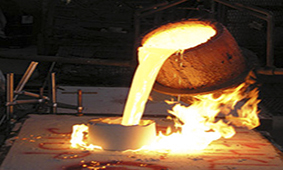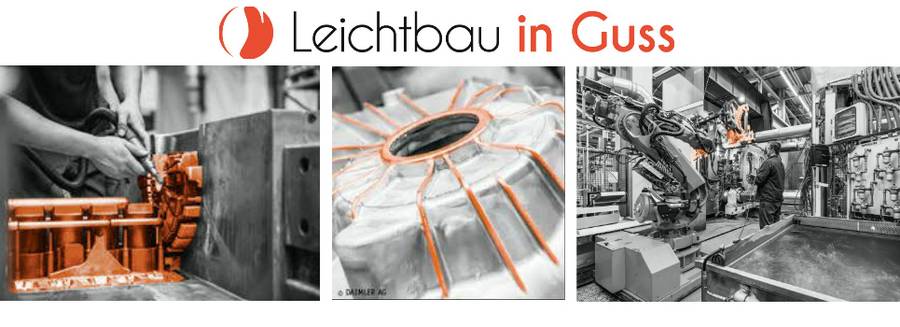
The Effects of industrial Changes are becoming more noticeable

Everything in the same week
The new Daimler boss Ola Källenius announces massive changes and billions in savings in the Daimler Group, economic experts report renewed downturn in the Far East, Europe's governments decide tangible measures to help protect the climate while TESLA flirts with a new Giga car factory near Berlin.
At the same time, experts from the foundry and automotive industry, science, engineering and associations will meet in Nürtingen near Stuttgart for the 13th edition of Leichtbau in Guss („Lightweight Construction in Casting“), as always brilliantly organized and carried out by Hanser Verlag Munich and the Technical University of Munich. Obviously, the event is happening at just the right time.
Digitization and differentiation as success factors in global competition
Lightweight construction will continue to be a high priority in the future, but the focus will increasingly be on digital processes, diverse material approaches and dealing with the consequences of changing conditions in the automotive powertrain.
"Digitization is the magic word of the future because it will change the entire production environment in the foundry process," notes Prof. Dr.-Ing. Wolfram Volk (Technical University of Munich Chair of Forming Technology and Foundry Industry) sets the trend.
Added to this are the changing future requirements in the field of e-mobility, which make it absolutely necessary to produce more complex and larger structural parts.
Embedded between interesting lectures from the practice of mechanical engineers, OEM projects, scientific work, economic approaches up to the view of the Chinese market and the ever encroaching Silk Road Logistics, was of course the visit to the Daimler Foundry (HPCD and LPDC) in Mettingen, a highlight of the event.
Program:
Construction-specific Process Design of Aluminum Structural Components in the Global Supply Network - Thomas Eisenbraun, Daimler AG Stuttgart
Alloy Development for Cast Structural Parts and their Heat Treatment - Dr. Hubert Koch, TRIMET Aluminum Essen
Large-scale Production of 3D-printed Sand Cores in the Automotive Industry - Francesc Roure Pastor, Loramendi Sales GmbH Ratingen
Simulation and optimization of the coring process of inorganic binder systems for light metal casting using the example of FILL - Florian Ettemeyer Fraunhofer IGCV Garching
Silk Road and Protectionism - New Challenges for German Foundries? - Heiko Lickfett, BDG Dusseldorf
China foundries: virtual and real - today and tomorrow - Dr. Konrad Weiss, RWP Roetgen
Innovative tools for high process availability - Georg Wetter, KRÄMER + GREBE Biedenkopf
Process and cost transparency in the digital core shop at INACORE - Dr. Julian Feinauer Pragmatic Minds GmbH Nürtingen
Simulation in the development process of innovative lightweight construction concepts - Dr.-Ing. Dipl.-Phys. Matthias Todte, Flow Science Germany GmbH Rottenburg
Automated component evaluation by inline computed tomography in the lightweight metal foundry at BMW AG in Landshut - Maxim Schlotterbeck, Otto von Guericke University Magdeburg
If you are interested in individual contributions, please contact us: tf(at)foundry-planet.com
Co-moderator Prof. Dr. med. Hartmut Hoffmann praised the depth and diversity of the contributions and the successful presentations.
Despite its austerity package, Daimler AG wants to continue investing in foundry
It was particularly striking that despite the austerity measures announced, Daimler AG would also be investing in the foundry (heat treatment, cleaning and reworking) and would like to achieve global interchangeability of components and tools.
The project of 3D-printed sand cores at BMW AG, supported by LORAMENDI, voxeljet and ASK, is intended to enable the tool-free production of highly complex cores that can not be produced with conventional core shooters and thereby also produce medium series, for example: castings for Electric Mobility.
Power of Choice at BMW AG
Despite the hype surrounding e-mobility, BMW AG also wants to leave consumers free to choose their vehicle drive.
"Power of Choice" is the magic formula here, with a focus on electric motors, hybrid drives and state-of-the-art comustion engines. This concept meets the requirements of the world market as well as the strict rules of the European Union. With this, BMW sets and important example. And maybe synthetic fuels will come sooner than we think.
Also noteworthy is the contribution of BDG economist Heiko Lickfett, who notes the opportunities for German and European foundries, despite all concerns about the Silk Road project. The project must not become a one-way street and requires Europeans to set their own USPs, because countering makes no sense in the long term, even more so when we consider that European ports and logistics centers are already benefiting from the changes.
From the point of view of an experienced foundry expert to China, Dr. Konrad Weiss, who also advises Chinese foundries: In terms of environmental standards and technology, a number of foundries in Middle China have caught up enormously and are constantly renewing, and up-to-date companies are being set up. The competition does not sleep. With the German education system in particular still so far ahead, it is important to tackle the challenges and do it courageously.
We will keep you up to date on the 14th edition of Leichtbau in Guss, which will take place in November 2020 in Nuremberg, near MAN!



Trump weighs using $2 billion in CHIPS Act funding for critical minerals

Codelco cuts 2025 copper forecast after El Teniente mine collapse

Electra converts debt, launches $30M raise to jumpstart stalled cobalt refinery

Barrick’s Reko Diq in line for $410M ADB backing

Abcourt readies Sleeping Giant mill to pour first gold since 2014

Nevada army depot to serve as base for first US strategic minerals stockpile

SQM boosts lithium supply plans as prices flick higher

Viridis unveils 200Mt initial reserve for Brazil rare earth project

Tailings could meet much of US critical mineral demand – study

Kyrgyzstan kicks off underground gold mining at Kumtor

Kyrgyzstan kicks off underground gold mining at Kumtor

KoBold Metals granted lithium exploration rights in Congo

Freeport Indonesia to wrap up Gresik plant repairs by early September

Energy Fuels soars on Vulcan Elements partnership

Northern Dynasty sticks to proposal in battle to lift Pebble mine veto

Giustra-backed mining firm teams up with informal miners in Colombia

Critical Metals signs agreement to supply rare earth to US government-funded facility

China extends rare earth controls to imported material

Galan Lithium proceeds with $13M financing for Argentina project

Kyrgyzstan kicks off underground gold mining at Kumtor

Freeport Indonesia to wrap up Gresik plant repairs by early September

Energy Fuels soars on Vulcan Elements partnership

Northern Dynasty sticks to proposal in battle to lift Pebble mine veto

Giustra-backed mining firm teams up with informal miners in Colombia

Critical Metals signs agreement to supply rare earth to US government-funded facility

China extends rare earth controls to imported material

Galan Lithium proceeds with $13M financing for Argentina project

Silver price touches $39 as market weighs rate cut outlook

















